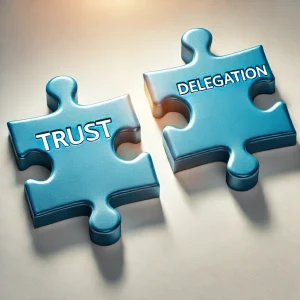Table of Contents
- 1 Build Trust: How Leaders Build Trust in Leadership for High-Performing Teams
- 1.1 🤝 Why Trust Matters in Effective Leadership and Team Performance
- 1.2 📊 The Business Case for Leadership Trust and Organizational Success
- 1.3 🔍 Three Reflection Points to Evaluate Trust in Leaders
- 1.4 🤝 Bridging Trust and Delegation: A Leadership Imperative
- 1.5 🔄 Build Trust and Delegation: The Missing Link
- 1.6 🔥 The Levels of Delegation: Understanding When and How to Delegate
- 1.7 🔥 Final Thoughts: High Trust is the Foundation of Effective Leadership
- 1.8 Next Step
Build Trust: How Leaders Build Trust in Leadership for High-Performing Teams
🤝 Why Trust Matters in Effective Leadership and Team Performance
What is the most pivotal element of a high-performance team? Build trust, and you create a foundation for success. Imagine a group of seasoned professionals, each bringing their expertise to the table, gathered for a strategic meeting. Amidst the discussion, a bold, innovative idea emerges. What distinguishes this team from others? Could it be trust in leadership? Leaders must build trust to foster a strong and engaged team. 🤔
In the rapidly evolving era of digital transformation, where AI is redefining our workplaces, the importance of trust in the workplace has escalated significantly. As business leaders, we often focus on organizational productivity, efficiency, and performance metrics, but one crucial aspect is frequently overlooked—the organizational culture we shape and the behaviors that build trust within teams.
Many leaders want to build trust but fail to recognize that trust isn’t built overnight. Employee engagement, trust levels, and workplace trust are all shaped by leadership behaviors. Research shows that a lack of trust in management results in disengaged employees, lower team performance, and high turnover. Leaders must establish trust to ensure that their teams function efficiently. Trusted leaders build trust over time by fostering transparency, effective communication, and accountability.

We like to believe we are making the best decisions for our teams, but do we ever reflect on how our leadership behaviors shape employee trust, confidence, and engagement? Trust among team members is critical for an effective leader. Some leaders inspire organizational culture based on high-trust leadership behaviors, while others create an environment of mistrust, hesitation, and disengagement. 😨
A high-trust company is not just about skills and experience—it is about the trust levels within the team that enable people to bring their best selves to work. The Edelman Trust Barometer and Harvard Business research consistently highlight the importance of trust in leaders. Without trust, employee engagement declines, workplace trust weakens, and team performance suffers. 🚀
📊 The Business Case for Leadership Trust and Organizational Success
Trust is the foundation of an effective leader’s success. Research found that high-trust companies outperform low-trust organizations in:
- 📈 Employee engagement and productivity – Trust helps employees feel valued and empowered, leading to better results.
- 👥 Employee trust and retention – A culture of trust fosters workplace satisfaction and reduces turnover.
- 🚀 Team performance and workplace trust – Great leaders build and maintain trust, ensuring better collaboration, faster decision-making, and a high-trust work environment.
If trust is broken within an organization, mistrust increases, morale declines, and productivity suffers—leading to inefficiencies and financial losses. Trust matters for business leaders because without trust, company culture and leadership development suffer.
🔍 Three Reflection Points to Evaluate Trust in Leaders
If you’re a leader, take a moment to reflect. The way you manage shapes your organizational culture—whether positively or negatively. The best leaders understand that trust is crucial. To assess the trust levels within your team, consider these three essential questions:
1️⃣ Do team members feel secure in expressing diverse viewpoints?
Why trust is important:
A high-trust workplace encourages effective communication, where team members feel safe sharing their thoughts without fear of criticism or retaliation. Employees who trust their leaders contribute diverse perspectives, which fuel innovation, collaboration, and a strong company culture. 💡
Self-reflection:
- When was the last time someone in your team openly disagreed with you? ❓
- Do your team members challenge ideas, or do they stay silent and simply follow orders? 🤐
- How do you respond when someone presents a viewpoint different from yours? 🤔
2️⃣ Is there a culture where mistakes are seen as growth opportunities?
Why trust matters:
Mistakes are inevitable, but how leaders acknowledge them defines whether a team grows or becomes fearful. A high-trust work environment embraces mistakes as learning opportunities, fostering leadership development and innovation. When people feel safe admitting errors, teams can address problems early, preventing minor issues from escalating into crises. ⚠️
Self-reflection:
- Do your team members hide mistakes from you, or do they proactively discuss challenges? 🙈
- When was the last time you openly acknowledged a mistake you made? 🔄
- Do you see errors as failures, or as stepping stones to better solutions? 🚧
3️⃣ Do team members trust their leaders and respect each other’s strengths?
Why trust in leadership is essential:
High-trust teams thrive on trust within their organization. When people trust their leaders, they work more effectively and engage in behaviors that build trust rather than mistrust. Senior leaders must create an environment where employees feel supported, respected, and empowered. 💪
Self-reflection:
- Do you micromanage tasks, or do you trust your team to take ownership? 🤨
- How often do team members acknowledge and appreciate each other’s strengths? 🎉
- Are responsibilities delegated in a way that maximizes individual and team potential? 🏆
🤝 Bridging Trust and Delegation: A Leadership Imperative
 Trust isn’t built overnight—it requires consistent actions, transparency, and leadership behaviors that empower individuals. While effective communication and respect form the foundation, one of the most practical ways leaders can build trust is through delegation.
Trust isn’t built overnight—it requires consistent actions, transparency, and leadership behaviors that empower individuals. While effective communication and respect form the foundation, one of the most practical ways leaders can build trust is through delegation.
When leaders delegate wisely, they send a strong message: “I trust you to handle this.” This not only boosts morale but also enhances employee trust, making team members feel valued and respected. However, if delegation is mishandled—or worse, absent—it can erode trust, causing mistrust, disengagement, and resentment.
🔄 Build Trust and Delegation: The Missing Link
Many leaders and managers understand the importance of trust, but few realize that effective delegation is one of the most powerful ways to build trust in the workplace.
When leaders fail to delegate properly, they inadvertently erode trust in three major ways:
1️⃣ Micromanagement Kills Confidence
 Many leaders micromanage with good intentions. They believe that by closely monitoring every detail, they can ensure that everything stays on track and avoid potential issues. However, what they fail to realize is that excessive oversight signals to employees that their judgment isn’t trusted. Instead of feeling empowered, team members become hesitant to take risks and initiate solutions, fearing their work will be second-guessed or corrected.
Many leaders micromanage with good intentions. They believe that by closely monitoring every detail, they can ensure that everything stays on track and avoid potential issues. However, what they fail to realize is that excessive oversight signals to employees that their judgment isn’t trusted. Instead of feeling empowered, team members become hesitant to take risks and initiate solutions, fearing their work will be second-guessed or corrected.
Over time, micromanagement creates an environment where:
- Employees only do the bare minimum rather than proactively problem-solve.
- Trust levels drop, and engagement decreases.
- Innovation and creativity suffer because individuals hesitate to speak up.
An effective leader must recognize when to step back and allow team members the freedom to make decisions while still providing guidance and support.
2️⃣ No Delegation Means Employees Feel Undervalued
 Some leaders hesitate to delegate because they fear losing control or think they can do the job better themselves. However, when employees are not given meaningful responsibilities, they start feeling like mere executors rather than valued contributors. They are unable to leverage their skills and experience, leading to frustration and disengagement.
Some leaders hesitate to delegate because they fear losing control or think they can do the job better themselves. However, when employees are not given meaningful responsibilities, they start feeling like mere executors rather than valued contributors. They are unable to leverage their skills and experience, leading to frustration and disengagement.
This lack of delegation signals:
- Leaders don’t trust their teams.
- Employees feel like tools rather than skilled professionals who can shine.
- A selfish leadership act, where managers hold on to power rather than develop their team’s potential.
High-trust companies ensure that leaders empower their teams by building trust within an organization. Great leaders delegate effectively so that employees feel capable, engaged, and motivated.
3️⃣ Over-Delegation or Inappropriate Delegation Creates Distrust
 On the other hand, some leaders take delegation to the extreme, offloading responsibilities without providing proper guidance or resources. This can make employees feel abandoned, increasing the risk of mistakes and failure. In some cases, leaders take credit for successes while shifting blame onto their teams when things go wrong.
On the other hand, some leaders take delegation to the extreme, offloading responsibilities without providing proper guidance or resources. This can make employees feel abandoned, increasing the risk of mistakes and failure. In some cases, leaders take credit for successes while shifting blame onto their teams when things go wrong.
This type of delegation causes:
- Mistrust and resentment, as employees feel like leadership is avoiding accountability.
- A culture of fear, where employees hesitate to take responsibility.
- Low workplace trust, with employees perceiving delegation as a way for leaders to push off risks rather than build capability.
Effective delegation requires a balance—leaders must provide clear expectations, support, and recognition to ensure their teams feel both empowered and secure.
✅ Delegation isn’t just about distributing tasks—it’s about empowerment, accountability, and creating a culture of trust.
🔥 The Levels of Delegation: Understanding When and How to Delegate
Effective leaders know that delegation isn’t simply a choice between delegating or not delegating—it involves different levels of delegation that should be applied strategically. Some tasks require close oversight, while others can be fully entrusted to team members.
🚀 The best leaders build and maintain trust by understanding:
- When to fully empower employees to make decisions.
- When to provide oversight while allowing autonomy.
- When to step in and give direct guidance.
Mastering these levels ensures that:
- Employees feel empowered, not abandoned.
- Leaders maintain accountability without micromanaging.
- A high-trust culture fosters innovation and collaboration.
🔥 Final Thoughts: High Trust is the Foundation of Effective Leadership
 Trust is the foundation of high-performing teams, effective leadership, and a thriving organizational culture. Without trust, communication breaks down, engagement declines, and workplace efficiency suffers. The best leaders build trust intentionally, creating an environment where employees feel valued, empowered, and motivated to perform at their best.
Trust is the foundation of high-performing teams, effective leadership, and a thriving organizational culture. Without trust, communication breaks down, engagement declines, and workplace efficiency suffers. The best leaders build trust intentionally, creating an environment where employees feel valued, empowered, and motivated to perform at their best.
Leadership trust isn’t just about words—it’s about actions. Leaders who foster trust through transparent communication, respect for diverse perspectives, and a culture of accountability build teams that innovate, collaborate, and succeed even in times of change.
Delegation is one of the most powerful ways to build trust. When leaders delegate effectively, they empower employees, reduce micromanagement, and encourage professional growth. However, delegation must be done correctly, balancing support with autonomy to avoid mistrust, disengagement, or resentment.
Next Step
🚀 As a leader, what steps will you take today to build trust in your workplace?
🔗 Learn how to master delegation and build a high-trust team in my course “Manager Training: Master Effective Delegation for Leaders“
🔗 Enroll now in my delegation mastery course and discover:
- ✅ The biggest delegation mistakes leaders make (and how to fix them).
- ✅ How to strike the right balance between trust and accountability.
- ✅ The different levels of delegation and when to apply them for maximum effectiveness.
- ✅ Proven frameworks to empower your team while improving efficiency.
Click here to start now!
By mastering delegation, you won’t just be offloading work—you’ll be building trust, confidence, and a truly self-sufficient team. Trust is essential in leadership, and leaders who delegate effectively create an environment where employees feel empowered, engaged, and valued.
📈 Also, don’t miss out on my blogs covering business strategies, management insights, job search, recruitment, technology and expert tips on credit control—essential reads for entrepreneurs and professionals! Explore them now!

